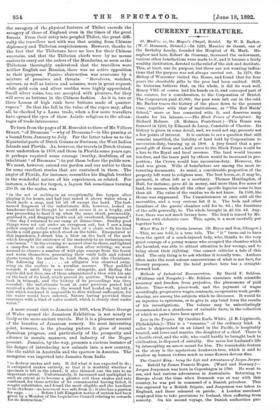CURRENT LITERATURE.
St. Mark's; or, the Mayor's Chapel, Bristol. By W. R. Barker. (W. C. Hemman, Bristol.)—In 1220, Maurice de Gaunt, one of the Berkeley family, founded the Hospital of St. Mark. His nephew and heir, Robert de Gournay, increased the endowment, various other benefactions were made to it, and it became a fairly wealthy institution, devoted to the relief of the sick and destitute. This, at least, was its purpose, but there are not wanting indic&. tions that the purpose was not always carried out. In 1278, the Bishop of Worcester visited the House, and found that for four years the charitable gifts to the poor had been omitted. Still, its historian believes that, on the whole, it did its work well. Henry VIII. of course laid his hands on it, and conveyed part of the estates, for a consideration, to the Corporation of Bristol. The Corporation paid £1,000; the poor were left out in the cold. Mr. Barker traces the history of the place down to the present time, together with that of institutions, as "The Red Maids' School," more or less connected with it, and deserves many thanks for his labours. —The Black Friars of Pontefract. By Richard Holmes. (R. Holmes, Pontefract.)—This House was founded in 1256, by Edmund de Lacey, Constable of Chester. Its history is given in some detail, and, we need not say, presents not a few points of interest. It is curious to see a question that still remains unsettled, the liability of land held by Corporations to succession-duty, turning up in 1308. A jury found that a pro- posed gift of three and a half acres to the Black Friars would be a loss to the Royal and local revenue. The land would become tax-free, and the taxes paid by others would be increased in pro- portion ; the Crown would lose succession-duty. However, the land was given. Wills of benefactors are among the most in- teresting documents. A,s usual, a considerable proportion of the property left went to religious uses. The best horse, or, it may be, garment, is often left as a mortuary. Thomas Huntingdon, of Hull, for instance, gave £5 in money, and more than five acres of land, for masses, while all the other specific legacies come to less than £3. The value of the residue we do not know. In 1539, the House was suppressed. The Commissioners at once sold all the moveables, and a very curious list it is. The beds and other furniture of the guests' chamber sold for 8s. 8d. ; the furniture of the cells generally, 8s. The whole brought in £5 10s. 4d. Any- how, there was not much luxury here. The land is traced by Mr. Holmes with elaborate care. This, again, is a most carefully put together book.






































 Previous page
Previous page